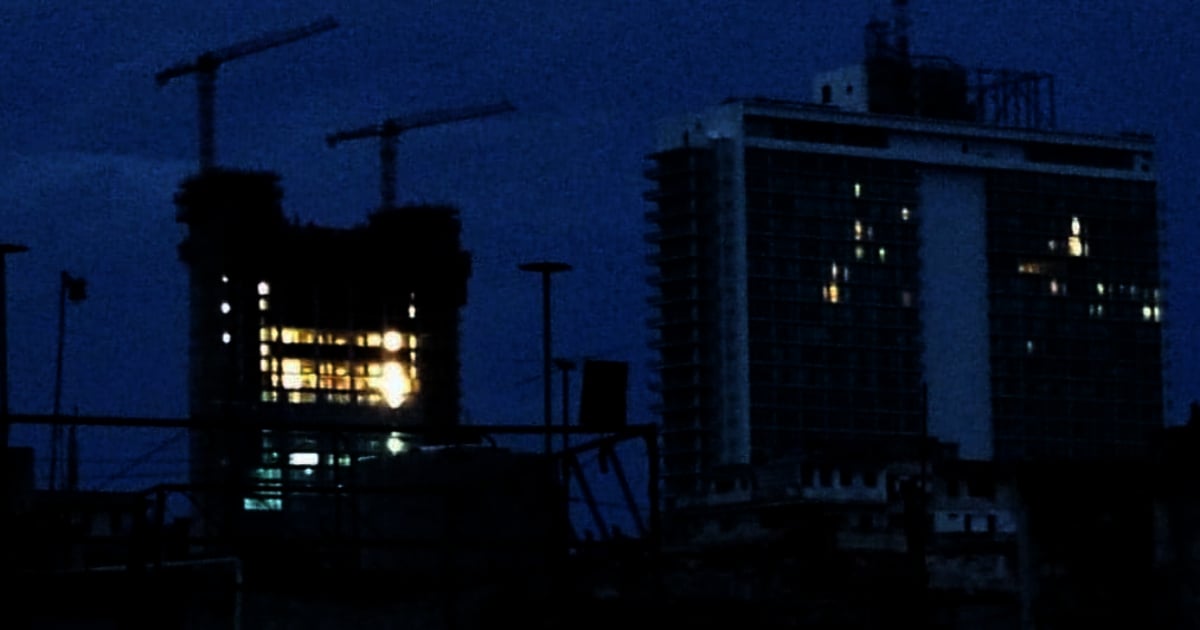The Cuban Electricity Union (UNE) has announced that the National Electric System (SEN) is grappling with a severe electricity generation crisis, leading to widespread power outages across much of the country over the weekend.
The energy situation remains dire, with a shortfall exceeding 1,200 MW anticipated during peak hours this Sunday, December 8. On Saturday, the deficit reached 1,526 MW at 6:10 PM, coinciding with the time of highest demand.
For Sunday, "a peak hour availability of 1,850 MW and a maximum demand of 3,050 MW is expected, resulting in a deficit of 1,200 MW. If current conditions persist, an impact of 1,270 MW is projected for this period," the state-run company stated on its social media platforms.
Maintenance and Fuel Shortages Exacerbate Crisis
Currently, outages due to breakdowns have affected unit 5 of the Mariel Thermoelectric Plant, unit 2 of the Felton Plant, and unit 6 of the Renté Plant. Additionally, four units are under maintenance, including plants in Cienfuegos, Santa Cruz, and Nuevitas. The generation deficit is further strained by fuel shortages, which have sidelined 56 distributed generation stations and two engines of the Santiago de Cuba barge, totaling a loss of 309 MW.
The UNE anticipates that unit 1 of Energás Jaruco will soon add 30 MW, while unit 6 of the same facility will contribute another 80 MW. However, these additions will not suffice to meet the expected demand. If current conditions hold, extensive blackouts will continue to plague large portions of the country, complicating daily life amid a persistent energy crisis.
Infrastructure Fragility and Public Dissatisfaction
The energy crisis in Cuba has worsened in December 2024, with numerous blackouts affecting much of the population. On December 4, the SEN collapsed following a failure at the Antonio Guiteras Thermoelectric Plant, the country's main facility, leaving millions without power. This incident marks the third similar event in less than two months, highlighting the vulnerability of Cuba's electrical infrastructure.
The situation has been exacerbated by fuel shortages and lack of maintenance at power plants. Furthermore, natural disasters like Hurricane Rafael have caused substantial damage, further complicating electricity generation and distribution.
The company led by Alfredo López Valdés has instituted scheduled blackouts of up to eight hours daily to manage the generation deficit, with some areas experiencing even longer outages, according to social media reports. This has sparked protests and criticism towards the authorities for their ineffective solutions.
The confluence of technical failures, natural disasters, and structural issues has plunged Cuba into a profound energy crisis, undermining the quality of life for its citizens and underscoring the urgent need for reforms in the electrical sector. In December, Cuba has experienced significant blackouts due to electricity generation deficits averaging 1,400 MW.
Understanding Cuba's Energy Crisis
What is causing the power outages in Cuba?
The power outages in Cuba are primarily due to a severe electricity generation crisis, exacerbated by fuel shortages and maintenance issues in power plants, along with natural disasters that have damaged infrastructure.
How is the Cuban government handling the electricity crisis?
The Cuban government has implemented scheduled blackouts to manage the electricity generation deficit. However, the situation has led to public dissatisfaction and calls for urgent reforms in the sector.
What impact do natural disasters have on Cuba’s power supply?
Natural disasters, such as hurricanes, have caused significant damage to Cuba's electrical infrastructure, further complicating the already strained generation and distribution of electricity.
